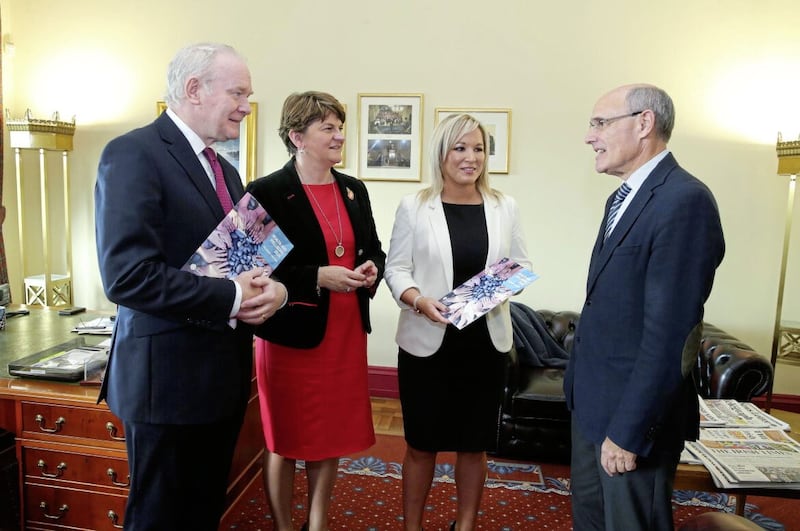Shortly after his appointment as health minister, Mike Nesbitt announced that he was inviting Professor Rafael Bengoa back to Northern Ireland, to help “reboot” the reform agenda.
The eminent expert returned to the north last week. His one-day visit to address a conference at the La Mon Hotel was an excruciating reminder of how little has been achieved in the eight years since the publication of his landmark report.
As expected, the professor was his usual charming, softly-spoken, affable self, noting that he was “of course very aware of the challenges Northern Ireland has faced over the period since 2016″.
He reassured his audience that we were by no means unique, as healthcare systems right across Europe were facing “major struggles”.
He is right. Healthcare systems face common challenges including funding constraints, workforce shortages, an ageing population, rising operational costs, growing demand and increased expectations.
However, the north is in a league of its own when it comes to underperformance in health and social care. The suffering that this has caused is hard to overstate.
Rather than struggling to keep pace with new technologies or adopt scientific advances, we are failing to deliver basic healthcare to huge swathes of the population. Thousands of citizens are on waiting lists that are longer than their life expectancy, with no realistic hope of this changing in the foreseeable future.
Given the stark lack of progress, Professor Bengoa unsurprisingly stressed that the need to implement his previous recommendations was more pressing than ever.

Once again, we were told that the current situation is unsustainable. If we don’t make radical changes within the next 15 years, the health service will swallow up all public funding.
Bengoa reiterated that we have all the tools needed to reform the system, we just need to get on with it.
It is worth stressing that the recommendations in the 2016 Bengoa Report did not come as earth-shattering news to anyone here. It was the latest in a long line of reviews that all pointed in the same direction of travel.
A need to reduce our reliance on hospitals, develop specialist hubs and enhance services in the community. Alongside this there should be a focus on prevention, early intervention and public health.
It is not Prof Bengoa’s job to point out the blindingly obvious fact that we have been abjectly failed by our politicians and those responsible for delivering change. However, there is a need to face up to some hard truths and the brutal reality of a litany of broken promises.
- Bengoa analysis: Health expert renews hope for reform after a generation of promisesOpens in new window
- Health and social care reforms can’t be dodged any longer - The Irish News viewOpens in new window
- There’s a blueprint to transform mental health services. Why won’t the Department of Health fund it? - Deirdre HeenanOpens in new window
The charge sheet against our politicians is particularly damning. Highlights include reform repeatedly sidestepped, waiting lists for elective care that have skyrocketed, mental health services under-developed and underfunded, outdated IT systems, no workforce planning, and primary care starved of resources. A cancer diagnosis is more likely to be a death sentence here than in any other region of the UK.
Compared to our counterparts in England, we can expect to wait seven times longer for hospital care. Poor productivity, inefficiency and duplication has led to a deplorable waste of resources and contributed to a stunted economy.
Those responsible for the design and delivery of services have not been held to account. Spending decisions are opaque, money does not follow the patient, a lack of robust data has hindered strategic planning. The lacklustre approach to implementing change has been repeatedly highlighted.
Given this damning reality, do we really need a one-day visit from an expert to resuscitate the reform agenda? Is it not obvious that this is the most pressing public policy we face? Can’t we work out for ourselves that the situation is dire? Do we really need more speeches, presentations on transformation, reconfiguration, rebuilding and reform?

Surely this Stormont administration does not need to be told that this is the single most pressing issue they face. They should be straining every sinew to address this diabolical mess. They preach change but will not grasp the nettle.
Since the re-establishment of the Stormont government early this year, precious little has changed. What progress has been achieved? We are still waiting for a plausible strategy for addressing waiting lists.
This month the long-awaited framework for hospital reconfiguration was finally published. Those who were expecting a detailed document with timescales and milestones were disappointed. Yet another underwhelming damp squib, little more than a broad-brush restating of principles. No detail on what specialities were going where, why and when.
What does the future hold for Daisy Hill or Causeway? Once again the thorny issues have been dodged and the hard decisions ducked.
At this stage I’m not sure there is anyone left here who truly believes that our politicians and the Department of Health are capable of delivering the long-promised radical overhaul.
No-one is under any illusions about the scale of the challenge or what is at stake, but if they don’t have the stomach for it, now would be a good time to say so.
Prof Bengoa’s visit was an excruciating reminder of how little has been achieved in the eight years since the publication of his landmark report



